Using open football data - Get ready for the World Cup in Brazil 2014
Football is the world’s most popular sport and the World Cup in Brazil - kicking off next month in São Paulo on June 12th (in 38 days 3 hours 15 minutes and counting) - is the world’s biggest (sport) event with 32 national teams from six continents competing in 64 matches in 12 cities for the championship title.
Where’s the open football data? Let’s ask the intertubes.
Now lets say you want to build a world cup match day widget for your site using a web service (HTTP JSON API) that gets you all teams, groups, matches, players, and so on.
Example - HTTP JSON API:
GET /event/worldcup.2014/teams
{
"event": {
"key": "worldcup.2014", "title": "World Cup 2014"
},
"teams": [
{ "key": "gre", "title": "Greece", "code": "GRE" },
{ "key": "ned", "title": "Netherlands", "code": "NED" },
{ "key": "ger", "title": "Germany", "code": "GER" },
{ "key": "por", "title": "Portugal", "code": "POR" },
...
]
}
Ideally, there’s a free service using open football data from the world football federation,
from the world’s sport cable channels, from the world’s sport newspapers, and so on.
Let’s ask the intertubes to find out the state of open football data in the real world -
let’s google json world cup brazil
or post a question on the open data stackexchange ‘Q: Any Open Data Sets for the (Football) World Cup (in Brazil 2014)?’.
Nothing. Nada. Nichts. Niente. Zilch. Zero. So what? Let’s build an open football data project.
What’s football.db?
Let’s welcome football.db. An open football data project
offering - suprise, suprise - free open public domain
football data for the World Cup in Brazil 2014, and more.

The open football project also sports a free self-hosted HTTP JSON API service for football data, for example. Get started in two steps:
- Step 1: Download the
worldcup2014.dbSQLite Database - Step 2: Serve up teams, rounds, matches, etc. via HTTP JSON API using the
sportdbcommand line tool
$ sportdb serve
Services available include:
/event/world.2014/teams– List all teams/event/world.2014/rounds– List all rounds (matchdays)/event/world.2014/round/20– List all matches in a round e.g. - 20th Round (=> Final)
GET /event/world.2014/round/1
{
"event": { "key": "world.2014", "title": "World Cup 2014" },
"round": { "pos": 1, "title": "Matchday 1" },
"games": [
{
"team1_key": "bra",
"team1_title": "Brazil",
"team1_code": "BRA",
"team2_key": "cro",
"team2_title": "Croatia",
"team2_code": "CRO",
"play_at": "2014/06/12",
"score1": null,
"score2": null,
"score1ot": null,
"score2ot": null,
"score1p": null,
"score2p": null
}
]
}
How does it work? Distributed is the new centralized
The open football data project collects public domain data sets
in plain old text files that you store on your hard disk
and that you can share with a distributed version tracker (that is, git repos)
with your friends or the world.
A free public domain command line tool (that is, sportdb)
lets you read the plain text data sets into your SQL database of choice
(for example, MySQL, PostgreSQL, SQLite, etc).
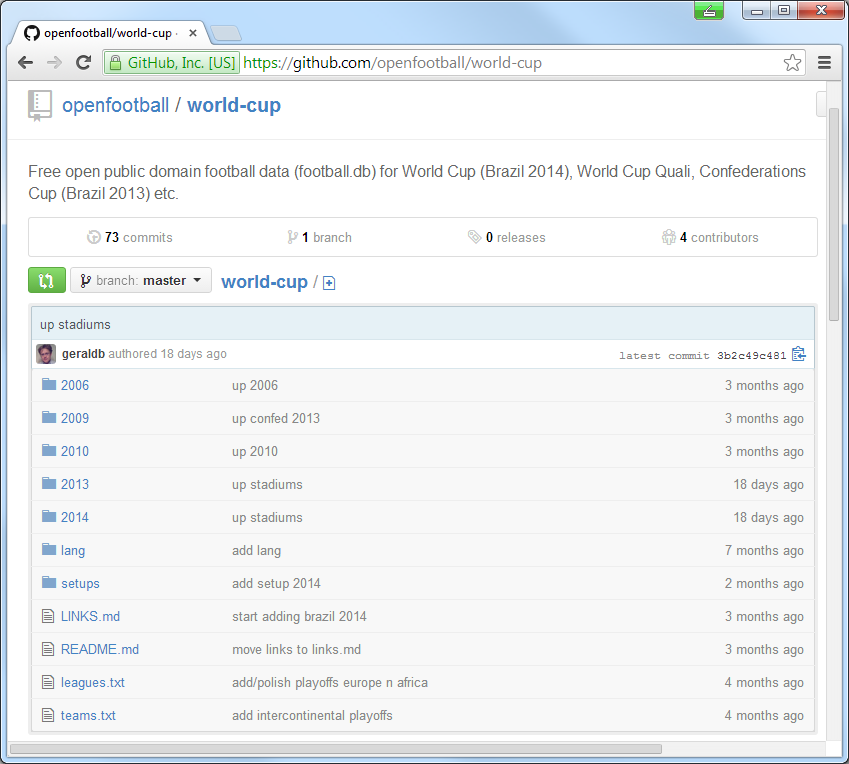
Example: europe/teams.txt - Comma-separated values
Let’s look at a plain text file for national teams in Europe, for example:
############
# UEFA (Union of European Football Associations)
# - 54 members
aut, Austria, AUT, at, fifa|uefa
bel, Belgium, BEL, be, fifa|uefa
cyp, Cyprus, CYP, cy, fifa|uefa
...
(Source: europe/teams.txt)
The plain text file uses the comma-separated values (CSV) format with some extras for comments, blank lines, etc.
Example: worldcup/2014/cup.txt - Mini football data language
For match schedules the open football project use a new strutured data format, that is, a new domain-specific language (DSL).
Example - Open Football Match Schedule Language:
(1) Thu Jun/12 17:00 Brazil - Croatia @ Arena de São Paulo, São Paulo (UTC-3)
(2) Fri Jun/13 13:00 Mexico - Cameroon @ Estádio das Dunas, Natal (UTC-3)
(Source: world-cup/2014/cup.txt)
Why invent yet another data format? The new mini language for structured football match schedule data offers you the best of both worlds, that is, 1) looks n feels like free-form plain text - easy-to-read and easy-to-write - 2) but offers a 100-% data accuracy guarantee (when loading into SQL tables, for example).
The mini language also includes support for groups, matchdays, grounds, and more. Example:
############################
# World Cup 2014 Brazil
Group A | Brazil Croatia Mexico Cameroon
Group B | Spain Netherlands Chile Australia
Group C | Colombia Greece Côte d'Ivoire Japan
Group D | Uruguay Costa Rica England Italy
Group E | Switzerland Ecuador France Honduras
Group F | Argentina Bosnia-Herzegovina Iran Nigeria
Group G | Germany Portugal Ghana United States
Group H | Belgium Algeria Russia South Korea
Matchday 1 | Thu Jun/12
Matchday 2 | Fri Jun/13
Matchday 3 | Sat Jun/14
...
(16) Round of 16 | Sat Jun/28 - Tue Jul/1
(17) Quarter-finals | Fri Jul/4 - Sat Jul/5
(18) Semi-finals | Tue Jul/8 - Wed Jul/9
(19) Match for third place | Sat Jul/12
(20) Final | Sun Jul/13
Group A:
(1) Thu Jun/12 17:00 Brazil - Croatia @ Arena de São Paulo, São Paulo (UTC-3)
(2) Fri Jun/13 13:00 Mexico - Cameroon @ Estádio das Dunas, Natal (UTC-3)
(17) Tue Jun/17 16:00 Brazil - Mexico @ Estádio Castelão, Fortaleza (UTC-3)
(18) Wed Jun/18 18:00 Cameroon - Croatia @ Arena Amazônia, Manaus (UTC-4)
(33) Mon Jun/23 17:00 Cameroon - Brazil @ Brasília (UTC-3)
(34) Mon Jun/23 17:00 Croatia - Mexico @ Recife (UTC-3)
Group B:
(3) Fri Jun/13 16:00 Spain - Netherlands @ Arena Fonte Nova, Salvador (UTC-3)
(4) Fri Jun/13 18:00 Chile - Australia @ Arena Pantanal, Cuiabá (UTC-4)
(19) Wed Jun/18 16:00 Spain - Chile @ Estádio do Maracanã, Rio de Janeiro (UTC-3)
(20) Wed Jun/18 13:00 Australia - Netherlands @ Estádio Beira-Rio, Porto Alegre (UTC-3)
(35) Mon Jun/23 13:00 Australia - Spain @ Curitiba (UTC-3)
(36) Mon Jun/23 13:00 Netherlands - Chile @ São Paulo (UTC-3)
...
Interested? Find out more at the project site or post your questions or comments to the forum/mailing list. Thanks.
Appendix: Basics - What’s (Not) Open (Structured) Data?
What’s (Not) Open (Structured) Data?
Example 1:
- A Free One-Page Booklet (PDF) Download for the Match Schedule from
fifa.com.- Copyright © FIFA 2014. All Rights Reserved.
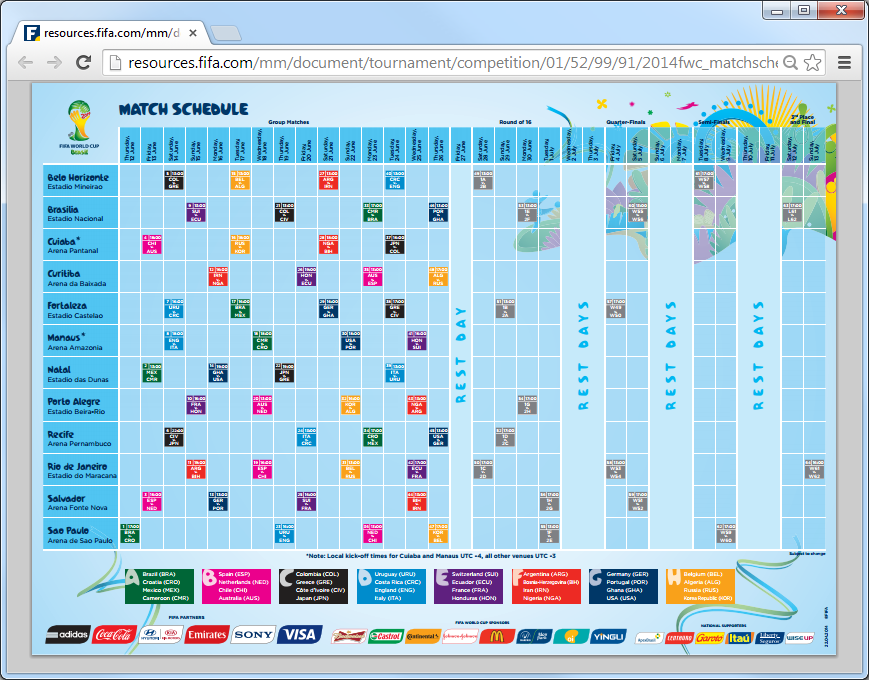
Example 2a:
- Match Schedule on FIFA Website
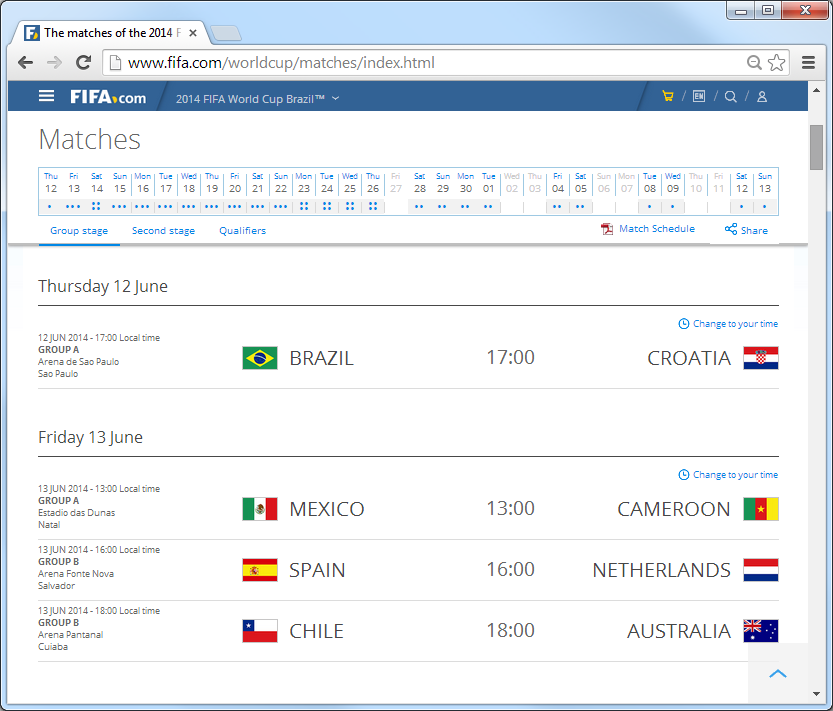
Example 2b:
- Match Schedule on FIFA Website (Source - Document Object Model Tree)
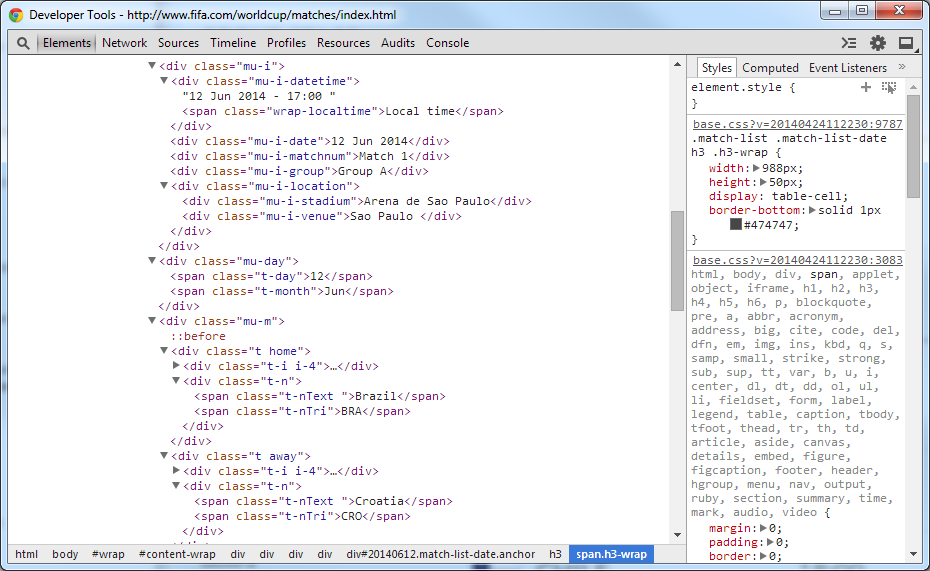
Example 3a:
- Match Schedule on Wikipedia
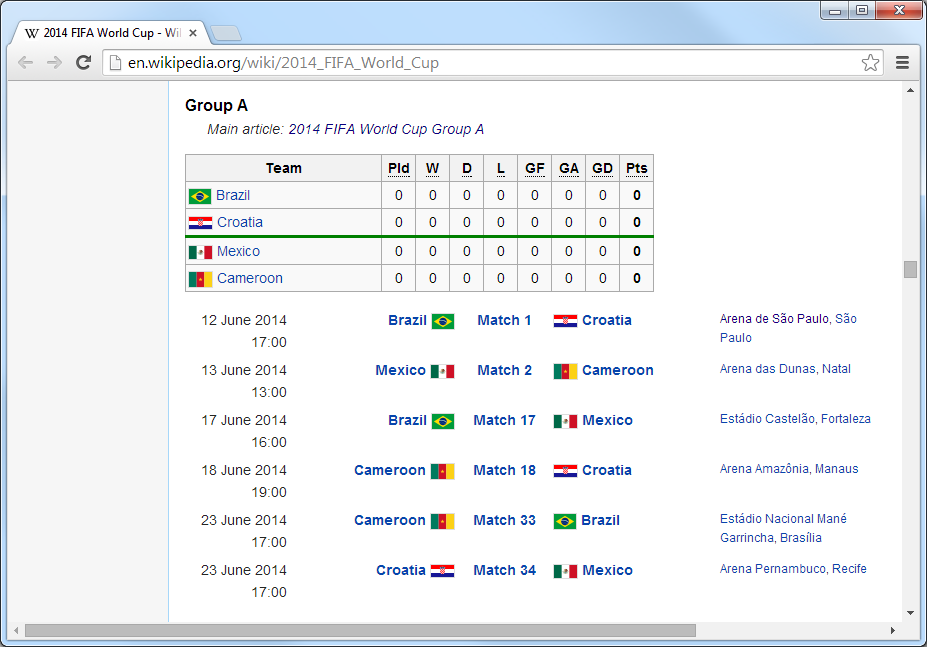
Example 3b:
- Match Schedule on Wikipedia (Source - Plain Text or Mediawiki Text)
Cut-n-Paste Text:
12 June 2014 17:00 Brazil Match 1 Croatia Arena de São Paulo, São Paulo
13 June 2014 13:00 Mexico Match 2 Cameroon Arena das Dunas, Natal
17 June 2014 16:00 Brazil Match 17 Mexico Estádio Castelão, Fortaleza
18 June 2014 19:00 Cameroon Match 18 Croatia Arena Amazônia, Manaus
23 June 2014 17:00 Cameroon Match 33 Brazil Estádio Nacional Mané Garrincha, Brasília
23 June 2014 17:00 Croatia Match 34 Mexico Arena Pernambuco, Recife
Wikipedia Source:
===Group A===
{{{{main|2014 FIFA World Cup Group A}}}}
{{{{Fb cl2 header navbar}}}}
{{{{Fb cl2 team |t={{{{fb|BRA}}}} |w=0 |d=0 |l=0 |gf=0 |ga=0 |bc=}}}}
{{{{Fb cl2 team |t={{{{fb|CRO}}}} |w=0 |d=0 |l=0 |gf=0 |ga=0 |bc=|border=green}}}}
{{{{Fb cl2 team |t={{{{fb|MEX}}}} |w=0 |d=0 |l=0 |gf=0 |ga=0 |bc=}}}}
{{{{Fb cl2 team |t={{{{fb|CMR}}}} |w=0 |d=0 |l=0 |gf=0 |ga=0 |bc=}}}}
|}
{{{{Football box
|date=12 June 2014
|time=17:00
|team1={{{{fb-rt|BRA}}}}
|score=[[2014 FIFA World Cup Group A#Brazil v Croatia|Match 1]]
|report=
|team2={{{{fb|CRO}}}}
|goals1=
|goals2=
|stadium=[[Arena Corinthians|Arena de São Paulo]], [[São Paulo]]
|attendance=
|referee=
}}}}
{{{{Football box
|date=13 June 2014
|time=13:00
|team1={{{{fb-rt|MEX}}}}
|score=[[2014 FIFA World Cup Group A#Mexico v Cameroon|Match 2]]
|report=
|team2={{{{fb|CMR}}}}
|goals1=
|goals2=
|stadium=[[Arena das Dunas]], [[Natal, Rio Grande do Norte|Natal]]
|attendance=
|referee=
}}}}
Edit Me! The football.db documentation site is a public GitHub repo. Please help by forking the repo and adding to it.